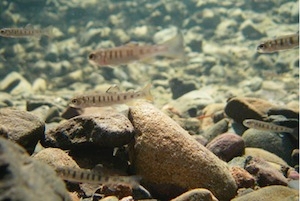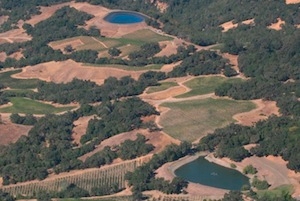The competition between farmers and fish for precious water in California is intensifying in wine country, say biologists at the University of California, Berkeley.
Juvenile steelhead trout, shown here in a small stream pool, are hit hard when water levels are low. (Ted Grantham photo)
A recently published study links higher death rates for threatened juvenile steelhead trout with low water levels in the summer and the amount of vineyard acreage upstream. Like salmon, steelhead trout migrate from freshwater streams to the ocean before returning to their birthplace to spawn. Steelhead trout in Southern California and the upper Columbia River are endangered, and several other populations, including those in Northern California, are threatened.
The researchers found that juvenile steelhead trout are particularly at risk during the dry summer season typical of California’s Mediterranean climate. Of the juvenile steelhead trout present in June, on average only 30 percent survived to the late summer. In years with higher rainfall and in watersheds with less vineyard land use, the survival of juvenile trout over the summer was significantly higher.
The researchers pointed out that salmon and trout conservation efforts have not adequately addressed summer stream flow. Previous studies have highlighted other limiting factors such as habitat degradation and water quality, while this study documented the importance of water quantity for restoring threatened populations.
Aerial view of vineyard agriculture in Sonoma County. Vineyards that divert water from streams used by juvenile salmon and steelhead trout could reduce their impacts by storing winter rainfall in small ponds such as the ones seen in this photo. (Adina Merenlender photo)
“Nearly all of California’s salmon and trout populations are on the path to extinction and if we’re going to bring these fish back to healthy levels, we have to change the way we manage our water,” said lead author Theodore Grantham, a recent Ph.D. graduate from UC Berkeley’s Department of Environmental Science, Policy and Management (ESPM). “Water withdrawals for agricultural uses can reduce or eliminate the limited amount of habitat available to sustain these cold-water fish through the summer.
Grantham says he is not suggesting we get rid of vineyards. “But we do need to focus our attention on water management strategies that reduce summer water use. I believe we can protect flows for fish and still have our glass of wine.”
Posted on
Friday, May 18, 2012 at
10:20 AM
- Author:
Ann Brody Guy
- Adapted from an article by:
Sarah Yang



